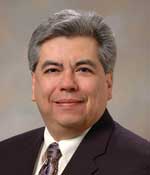Carlos Gutierrez
Biography:
 Carlos J Gutierrez is the Manager of the Surface and Interface Sciences Department at Sandia National Laboratories (NM). His Department focuses on fundamental nanostructured energy materials research and nanoelectronic materials research (often with external industry and academic engagement) supporting mission-relevant science-based engineering technology innovation. At Sandia, he is engaged in various workforce diversity activities, and he has represented Sandia at DOE/NSF-sponsored Gender Equity in Materials Science and Engineering Workshops. Gutierrez received his Ph.D. and M.S. Degrees in Physics and Astronomy from the Johns Hopkins University, and a B.S. in Physics from the University of Dallas. He served as a NRC Postdoctoral Research Associate at the Naval Research Lab conducting spintronics research with Gary Prinz. Prior to joining Sandia, Gutierrez served as a Professor of Physics at Texas State University from 1992-2005, where he led the development of an innovative professional master’s degree Materials Physics program in close engagement with industry that received recognition from the AIP/APS, and support from the NSF. Gutierrez was awarded the 2001 Texas State University Presidential Award in Scholarly Excellence. Gutierrez’ independent research has been disseminated in over 40 journal publications and 80 talks, and his Sandia Department annually averages ~50 peer-reviewed research journal publications, ~40 contributed talks, and ~20 invited talks. He served as Chair of the APS Committee on Minorities, and on the Steering Committee of the Conference on Magnetism and Magnetic Materials. He served on the BOD for the Society of Chicanos and Native Americans in Science, and under his faculty leadership the newly formed Texas State University Society of Mexican American Engineers student chapter pioneered the “Science Extravaganza” science and engineering outreach concept that was later adopted by the National MAES Organization. Gutierrez has been recognized for "Professional Achievement" and as “Most Promising Scientist”, in 2009 and 1996, respectively, by the Hispanic Engineer National Achievement Awards Committee.
Carlos J Gutierrez is the Manager of the Surface and Interface Sciences Department at Sandia National Laboratories (NM). His Department focuses on fundamental nanostructured energy materials research and nanoelectronic materials research (often with external industry and academic engagement) supporting mission-relevant science-based engineering technology innovation. At Sandia, he is engaged in various workforce diversity activities, and he has represented Sandia at DOE/NSF-sponsored Gender Equity in Materials Science and Engineering Workshops. Gutierrez received his Ph.D. and M.S. Degrees in Physics and Astronomy from the Johns Hopkins University, and a B.S. in Physics from the University of Dallas. He served as a NRC Postdoctoral Research Associate at the Naval Research Lab conducting spintronics research with Gary Prinz. Prior to joining Sandia, Gutierrez served as a Professor of Physics at Texas State University from 1992-2005, where he led the development of an innovative professional master’s degree Materials Physics program in close engagement with industry that received recognition from the AIP/APS, and support from the NSF. Gutierrez was awarded the 2001 Texas State University Presidential Award in Scholarly Excellence. Gutierrez’ independent research has been disseminated in over 40 journal publications and 80 talks, and his Sandia Department annually averages ~50 peer-reviewed research journal publications, ~40 contributed talks, and ~20 invited talks. He served as Chair of the APS Committee on Minorities, and on the Steering Committee of the Conference on Magnetism and Magnetic Materials. He served on the BOD for the Society of Chicanos and Native Americans in Science, and under his faculty leadership the newly formed Texas State University Society of Mexican American Engineers student chapter pioneered the “Science Extravaganza” science and engineering outreach concept that was later adopted by the National MAES Organization. Gutierrez has been recognized for "Professional Achievement" and as “Most Promising Scientist”, in 2009 and 1996, respectively, by the Hispanic Engineer National Achievement Awards Committee.
Statement:
If elected as Secretary/Treasurer for FIAP, I have a complementary set of intertwined Academic, National Laboratory, and Industry experiences and contacts that will add value to the committee’s activities and help further members’ interests, especially through FIAP contributions at APS meetings. My broad experience interacting with industry as a professor (working closely with the AIP/APS and NSF), and as a research manager of a prominent National Laboratory research organization, provides me with a balanced perspective that will help FIAP “enhance the APS' ability to meet the needs of the industrial and applied physics community, and help APS take advantage of the evolving opportunities in the practice and application of physics.” I will further FIAP’s activities highlighting interesting industrial physics topics to the broader APS community, and I am interested in helping strengthen this communication to physics education and science teacher’s organizations to improve information accessibility earlier in the talent pipeline. I will also work to help increase the awareness of the rewarding challenge of successfully crossing the “valley of death” between fundamental discovery and useful application, bringing increased recognition to this often unappreciated, yet crucial, activity. I will work with other members to communicate and recognize exciting non-traditional or emerging applied or industrial physics career opportunities that may escape broader society or layman attention. I have special awareness of the present and emerging contributions that physicists can make in Nanoscience and Nanoengineering that are vital for the successful development of new technologies and devices that can impact the world’s growing energy and security problems. Thus, if elected, I will work to enhance the cooperative collaboration of the international physics community towards solving difficult, complex, multi-disciplinary problems. I will also help FIAP look within our national borders, and use my experience to help further improve FIAP engagements and collaborations that target the recruitment of underrepresented groups into the applied and industrial physics pipeline.
